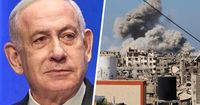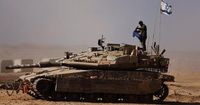On August 20, 2025, the Israeli military announced it had entered the first stages of a planned ground assault on Gaza City, marking a significant escalation in a conflict that has gripped the region for nearly two years. According to Israeli Defense Forces (IDF) spokesperson Brigadier General Effie Defrin, troops are already operating in the Zeitoun and Jabalia neighborhoods on the outskirts of Gaza City, laying the groundwork for a broader campaign to capture and occupy the city in its entirety. This move comes after Israeli Defence Minister Israel Katz approved the operation on August 19, with the plan set to be presented to the security cabinet later in the week, as reported by BBC and FRANCE 24.
The operation represents the latest phase in Israel’s military campaign that began on October 7, 2023, following a Hamas-led attack on southern Israel that killed about 1,200 people and resulted in 251 hostages being taken. Since then, the conflict has exacted a devastating toll on Gaza’s civilian population. According to Gaza’s health ministry, at least 62,122 people have been killed in the territory since the campaign began—a figure cited by the United Nations and widely regarded as the most reliable available.
As the IDF moves forward, the plan is to call up approximately 60,000 reservists at the beginning of September to free up active-duty personnel for the operation. Hundreds of thousands of Palestinians in Gaza City are expected to be ordered to evacuate and seek shelter in southern Gaza, a displacement that the International Committee of the Red Cross (ICRC) warns could worsen an already catastrophic humanitarian situation for the enclave’s 2.1 million residents.
“After months of relentless hostilities and repeated displacement, the people in Gaza are utterly exhausted. What they need is not more pressure, but relief. Not more fear, but a chance to breathe. They must have access to the essentials to live in dignity: food, medical and hygiene supplies, clean water, and safe shelter,” the ICRC stated, as quoted by BBC. The organization cautioned that any further intensification of military operations would only deepen suffering, tear more families apart, and threaten an irreversible humanitarian crisis. “The lives of hostages may also be put at risk,” the statement added, calling for an immediate ceasefire and rapid, unimpeded humanitarian access across Gaza.
According to Israeli military officials, the current phase involves two IDF brigades operating in Zeitoun, where troops recently located an underground tunnel containing weapons, and a third brigade active in Jabalia. Brigadier General Defrin emphasized that the IDF is “not waiting” to begin the operation, stating, “We have begun the preliminary actions, and already now, IDF troops are holding the outskirts of Gaza City.” He described Hamas as “battered and bruised” after 22 months of war and outlined the military’s intention to “deepen the damage to Hamas in Gaza City, a stronghold of governmental and military terror for the terrorist organization.”
Despite these assertions, the toll on civilians remains grave. On August 20, Israeli strikes killed 25 people across Gaza, including three children and their parents whose home in the Badr area of the Shati refugee camp, west of Gaza City, was bombed, according to Gaza’s Hamas-run Civil Defence agency and reported by AFP. Mahmoud Bassal, a spokesman for the agency, described the situation in Zeitoun and the neighboring Sabra district as “very dangerous and unbearable.”
The IDF claims it is making efforts to minimize harm to civilians and has pledged to warn Gaza City’s civilian population to evacuate for their safety. However, with hundreds of thousands expected to be displaced and with mounting casualties, international concern is growing. French President Emmanuel Macron warned on August 20 that Israel’s planned assault “can only lead to disaster for both peoples and risks plunging the entire region into a cycle of permanent war,” as reported by BBC.
The fate of hostages still held by Hamas in Gaza adds another layer of complexity and urgency. The IDF estimates that 50 hostages remain in Gaza, with 20 believed to be alive. Families of those hostages have expressed fears that a ground offensive could endanger their loved ones. The ICRC echoed these concerns, stating that intensified military activity could place hostages at even greater risk.
Diplomatic efforts to halt the violence have so far faltered. Mediators Qatar and Egypt have proposed a new plan for a 60-day truce and the release of about half the hostages, which Hamas said it accepted on August 18. However, Israel has yet to submit a formal response, with officials insisting they will no longer accept a partial deal and demanding a comprehensive agreement that would see all hostages released. On August 20, Hamas accused Israeli Prime Minister Benjamin Netanyahu of disregarding the mediators’ ceasefire proposal and called him “the real obstructionist of any agreement,” according to Reuters.
Meanwhile, the humanitarian situation in Gaza continues to deteriorate. The ICRC and other aid organizations stress the urgent need for food, medical supplies, clean water, and safe shelter, as well as the unimpeded passage of humanitarian assistance. With repeated displacement and relentless hostilities, Gaza’s population faces exhaustion and deprivation on a massive scale.
The Israeli government maintains that its intention is to conquer the entire Gaza Strip following the breakdown of indirect talks with Hamas last month. The stated goal is to dismantle Hamas’s military infrastructure and sever the civilian population’s dependence on the group. Yet, as ground operations intensify and the prospect of a full-scale occupation looms, the risk of further civilian casualties and regional destabilization grows ever more acute.
As the world watches, the question remains: will diplomatic channels succeed in averting even greater catastrophe, or is Gaza City on the brink of a new and even more destructive chapter in this long-running conflict? For now, the people of Gaza—caught between the hammer of war and the anvil of humanitarian crisis—wait for relief that seems as elusive as ever.





